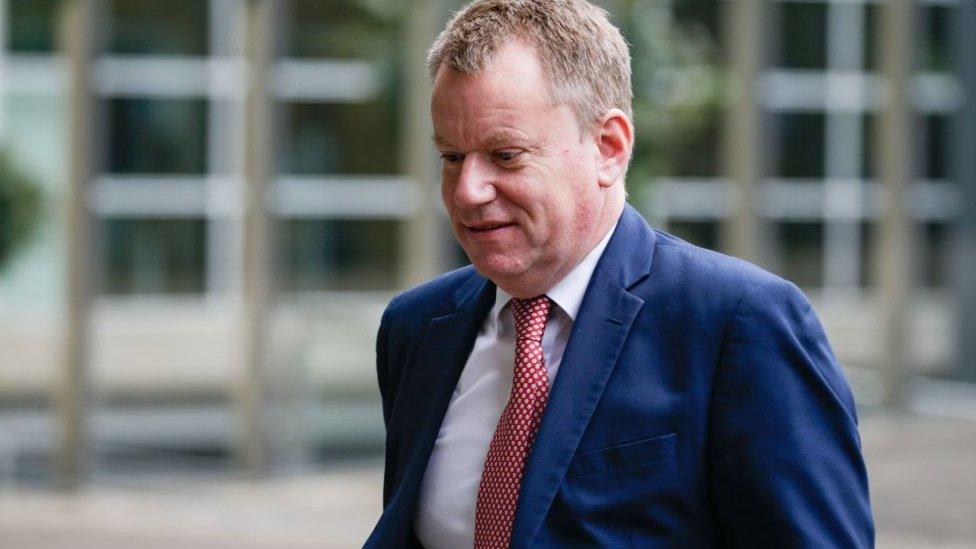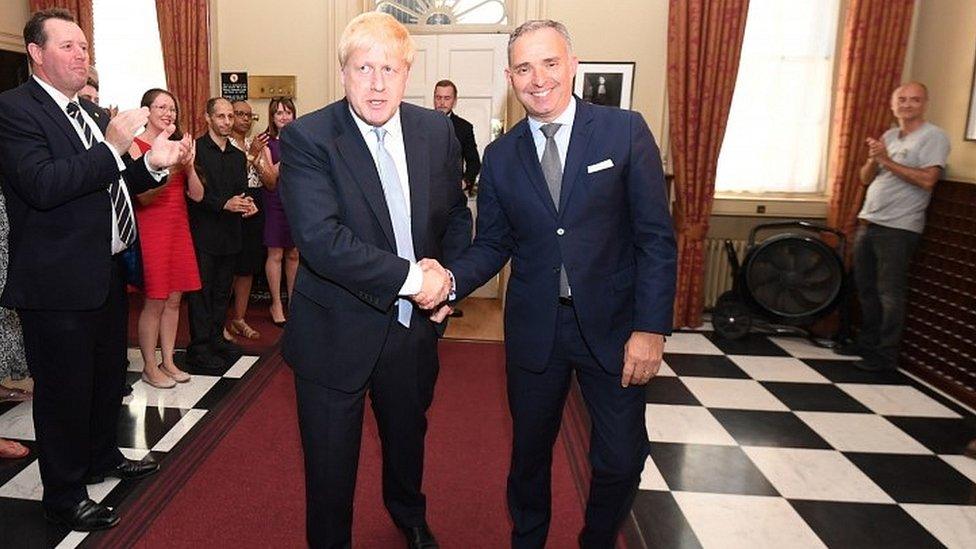David Frost: Does it matter if the national security adviser is politically appointed?
- Published

Installing a political appointee as the prime minister's new national security adviser is a significant departure.
The move is motivated by a desire to make the government machine more responsive but has raised questions about what it means for a security and intelligence community already in transition.
The job of national security adviser (NSA) involves acting as the principal adviser to the prime minister on security and foreign policy and overseeing the relevant machinery of government, including the UK's spies.
Day to day operational responsibility for MI6 and GCHQ lies with the foreign secretary and MI5 with the home secretary but over many years Downing Street has been increasing its reach and the national security adviser oversees the intelligence budget and carries out performance reviews of the heads of the three agencies.
They also oversee implementation of decisions by the National Security Council, on which ministers and defence and intelligence chiefs sit.
Although an experienced diplomat and negotiator, the new national security adviser David Frost does not have a particular background in security and intelligence issues in the way his predecessor Mark Sedwill had.
His appointment looks to mark a shift to focusing on repositioning the UK in a post-Brexit world, with potentially a greater focus on trade and prosperity than hard-edged security, reflecting the prime minister's priorities.
And it comes as a major integrated review of security and defence is under way which could herald radical changes to spending, priorities and structures.
The nature of this appointment makes clear that delivering change will be at the top of the agenda, which may worry parts of the Ministry of Defence since its budget has come under particular criticism.
Some have raised questions about having a political appointee in such a sensitive role.
Although the equivalent role in the US and some European countries is politically appointed that has not been the case in the UK (despite some discussion of it at the start of the 2010 coalition government).
The crucial question, one former senior intelligence official says, is whether the new adviser will be able to speak 'truth to power' by telling the prime minister something he does not want to hear.
The intelligence community still bears the scars of the Iraq war period when some felt there was insufficient challenge to policy set by Downing Street when some officials got too close.
Much, observers say, will depend on how Mr Frost embarks on the role and how he wields - or even tries to expand - his influence.
One former official said the foreign and home secretaries would likely resist any attempt to diminish their political role overseeing the agencies.
They said it was Frost's presence in the House of Lords that seemed most risky, especially if it turned him into something more like a minister for intelligence and security as well as an adviser.
On the other hand, he could delegate some of the aspects of the job to his two deputies, who have normally been experienced civil servants, and focus on the advisory role, to reduce potential tensions.
Not everyone is sure that having a more independent figure in that position is a mistake.
One person who has worked closely with the role said there may be benefits in having someone who has a broader perspective than a traditional 'securocrat' and who is not captured by what they call 'the machine'.
They argue it can be a mistake to have people from inside the world overseeing the intelligence services because there is a need to sometimes challenge their assumptions and the priority given to their views within the National Security Council.
The appointment comes at a transitional moment for the UK intelligence community. Ken McCallum has just taken over as head of MI5. A new head of the National Cyber Security Centre (part of GCHQ) is due to be appointed over the summer. And interviews have just been completed for a new head of MI6. A recommendation is normally made by senior civil servants who carried out the interviews but this goes to the foreign secretary (and potentially the prime minister) for approval, offering a route for influence.
Any perception that the job of running one of the intelligence agencies, and not just acting as the prime minister's adviser, is to become a political appointment would likely lead to many more questions - even from those who do not normally speak out.
- Published28 June 2020
- Published29 June 2020
